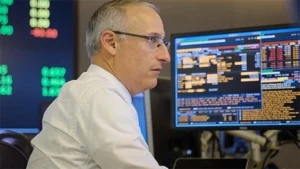Pacific Investment Management Co. (Pimco) is exploring new ways to help struggling businesses secure funding in a tough lending environment. Jamie Weinstein, a key figure in Pimco’s $170 billion alternative investment division, mentioned in a recent statement that they see opportunities to provide financial support to companies looking to strengthen their finances during these uncertain economic times.
In this approach, which can be seen as an expansion of their private credit activities, Pimco is not only offering loans but also considering investments in both stocks and bonds in complex financial transactions across various parts of the borrower’s financial structure.
Weinstein stated, “We are witnessing a growing interest in private financial solutions and initiatives aimed at bolstering a company’s financial health.” He went on to explain that this market has the potential to offer returns similar to those of private equity investments but with a reduced level of risk.

To keep up with increasing demand, the California-based company has been expanding its Capital Solutions business. Since 2020, the number of portfolio managers focused on private strategies has grown by 50%, reaching 125 as of the end of August. Additionally, they’ve doubled the support staff for this business segment, including professionals in capital markets and asset management, bringing the total team size to 208, according to Michael Reid, the firm’s spokesperson.
This expansion illustrates how investment firms are searching for ways to increase their returns by exploring innovative lending approaches, especially as traditional banks become more cautious and reduce lending to minimize the risk of loan defaults. Pimco’s alternative investment business also encompasses specialty finance and real estate.
While yields on new private deals have recently seen a slight decline, the capital solutions field remains a “buyer’s market,” which means there are wider profit margins and higher returns, as noted by Weinstein.
For lenders involved in these types of transactions, returns can take various forms, including cash, paid-in-kind interest, upfront and exit fees, and sometimes even equity participation.
Pimco is also ready to take advantage of opportunities to acquire portfolios from banks that are scaling back their operations. They are considering lending against a range of assets, including aircraft leasing, equipment and inventory financing, auto and consumer loans, and credit card portfolios.
“Exploring the Exciting Side of Investment: Pimco’s Focus on the ‘Fun Sector’
Pimco, a prominent asset manager, is strategically positioning itself to ride the wave of a rebound in the tourism industry. They have their sights set on what they affectionately refer to as the ‘fun sector.’
This is a market segment that, until recently, has been somewhat overlooked by investors. Within this ‘fun sector,’ we find a diverse range of exciting opportunities, including airlines, hotels, gaming, vacation-related businesses, rental properties, theme parks, and concert venues. Mark Kiesel, who serves as Pimco’s Chief Investment Officer for global credit, is at the forefront of this strategic shift.
At first glance, it might seem unusual to categorize these industries under the ‘fun sector.’ Still, it makes sense when you consider the pleasure and entertainment these businesses bring to people’s lives.
While these areas have undoubtedly been affected by economic challenges and uncertainties, they have also displayed remarkable resilience and adaptability.
Take airlines, for instance. They have been generating impressive double-digit profit growth, a clear sign of their financial strength and ability to weather turbulent times.
Many airline companies are wisely directing a substantial portion of their excess cash toward reducing their debt burden. This strategic move not only strengthens their financial position but also enhances their ability to navigate economic fluctuations successfully.
Similarly, the gaming industry is witnessing a comparable resurgence. As Mark Kiesel points out in his statement, this sector is showing signs of robustness and growth.
This renewed vigor in gaming is not only good news for companies operating within the industry but also for investors seeking opportunities in this dynamic space.
One notable aspect of these thriving sectors is that bondholders are emerging as the primary beneficiaries. As these industries continue to flourish, those holding bonds are reaping substantial rewards. This is a testament to the profitability and financial health of these businesses.
To align with this evolving landscape and seize the opportunities it presents, Pimco is making strategic adjustments to its investment approach. One notable move is their decision to reduce exposure to the banking sector.
This decision stems from the fact that the pricing of bank assets has become less attractive in comparison to the promising prospects offered by the ‘fun sector’ and similar thriving industries.
Kiesel elaborates on the reasons behind this strategic shift. He notes that monetary policy is gradually becoming more restrictive. While the intention behind such policy changes may be prudent, there is a potential downside.
There are growing concerns that this could lead to an economic slowdown, or in a more pessimistic scenario, even a mild recession.
In times of economic uncertainty, the dynamics of investing can change. Kiesel’s observation that it is often more advantageous to consider investments in banks after a recession, rather than before one, carries significant weight.
Such a strategy can capitalize on the potential for recovery and growth that often follows a period of economic downturn.
In conclusion, Pimco’s strategic focus on the ‘fun sector’ and its determination to adapt to changing market conditions reflect a commitment to identifying and harnessing promising investment opportunities.
This forward-thinking approach acknowledges the resilience and profitability of industries that bring joy and entertainment to people’s lives. While the economic landscape may be evolving, Pimco’s willingness to explore innovative avenues and align its investment strategies accordingly demonstrates a commitment to achieving success in both the present and future financial landscapes.”





